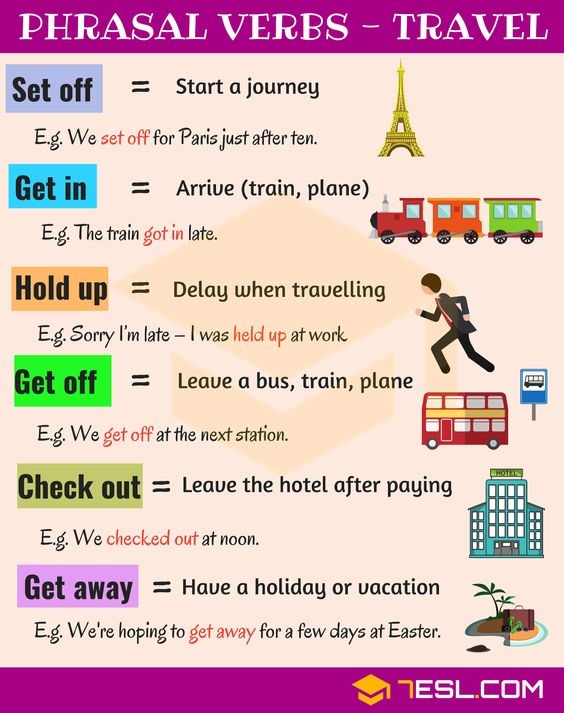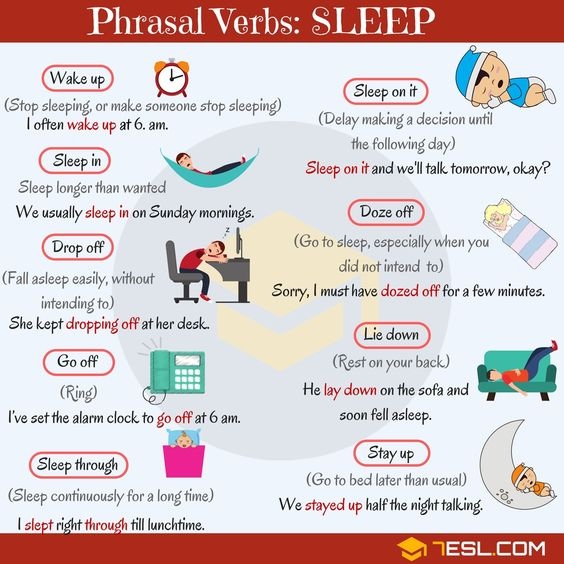

Phrasal Verbs
What are Phrasal Verbs?
A phrasal verb is a combination of words (a verb + a preposition or verb +adverb) that when used together, usually take on a different meaning to that of the original verb.
Phrasal Verb Examples
- break down, check in, tear up
When we use phrasal verbs, we use them like normal verbs in a sentence, regardless if it’s a regular or irregular verb.
- Ella tore up the letter after she read it.
- Their car broke down two miles out of town.
- Did the manager deal with that customer’s complaint.
More phrasal verb examples
- Be sure to put on a life jacket before getting into the boat.
- We left out the trash for pickup.
- It’s time to get on the plane.
- What will she think up next?
- I’m having some trouble working out the solution to this equation.
- We’re going to have to put off our vacation until next year.
- Stand up when speaking in class, please.
- We’ll have to wake up early if we want breakfast.
- Take off your shoes before you walk on the carpet.
- My dog likes to break out of his kennel to chase squirrels.
Phrasal Verb Exercises
Choose the correct phrasal verb from the parenthesis at the end of the sentence.
- Someone broke into my car last night and stole the stereo. (broke down/broke into)
- Will you be able to get by this month with the little you have?(get off / get by)
- His father always taught him not to _____ those people with less. (look up to / look down on)
- Stop complaining and _____ your work! (get on with / get over)
- The boss wants you to _____ your figures for this month to him. (hand out / hand in)
- We’re going to have to _____ our trip to Spain until September. (put up/ put off)
- I _____ Amir today at the supermarket. It was great to see him. (ran out of / ran into)
- I’m so tired of Sophie _____ her engagement ring all the time. (showing off, showing up)
- The police would not _____ to the kidnapper’s demands. (give up/ give in)
- I thought I would _____ for a cup of coffee. Is that okay? (drop off/ drop in)
- Have you ever _____ such an unusual piece of art? (come forward/come across)
- It’s important to _____ on time. (show up / show off)
- _____ your feet when walking; you don’t want to trip! (uplift / lift up)
- The tree was _____ by the wind. (blown up / blown over)
- He _____ his hat to show me his new haircut. (took off / took up)
- I just can’t seem to _____ this book. (get off / get into )
Answers
- look down on
- get on with
- hand in
- put off
- ran into
- showing off
- give in
- drop in
- come across
- show up
- lift up
- blown over
- took off
- get into

Easy Learning English Verbs
Collins Easy Learning Verbs is an accessible introduction to English verbs, tenses and morphology. With clear, concise explanations of English verb systems, this book is an indispensable guide for the language learner.
Collins Webster’s Easy Learning Verbs is the helpful guide to English verbs. Covering tense, aspect, modality and the morphological structures of verbs as well as irregular and phrasal verbs, the English learner will appreciate the clear guidance provided in this book. Each point is described in a user-friendly format that combines explanations with examples from modern English.







